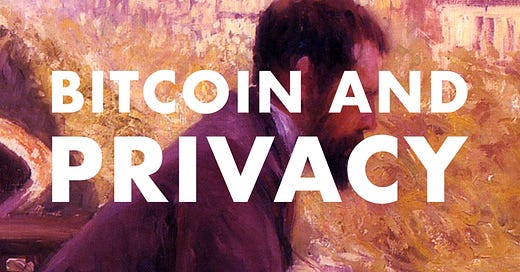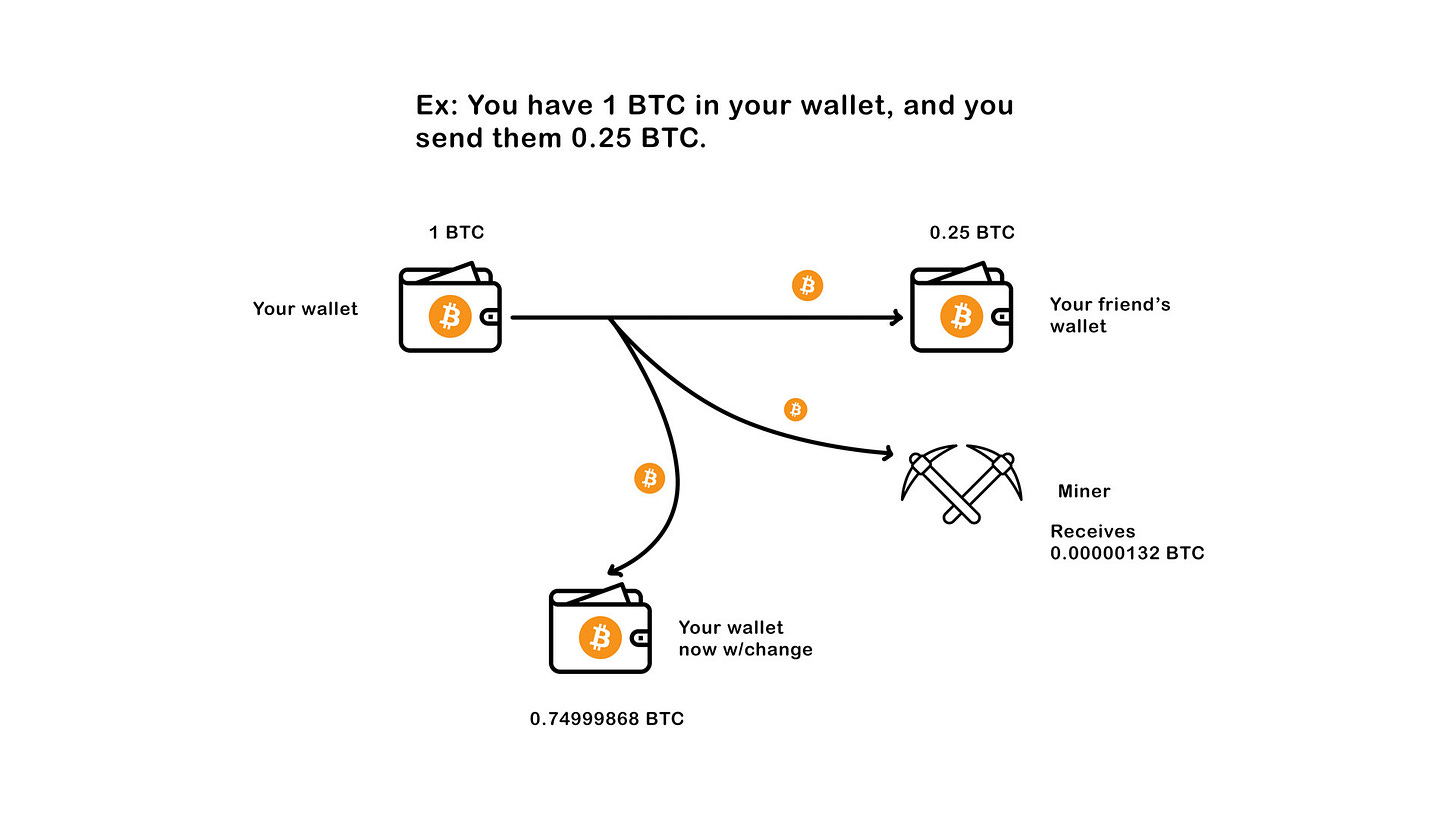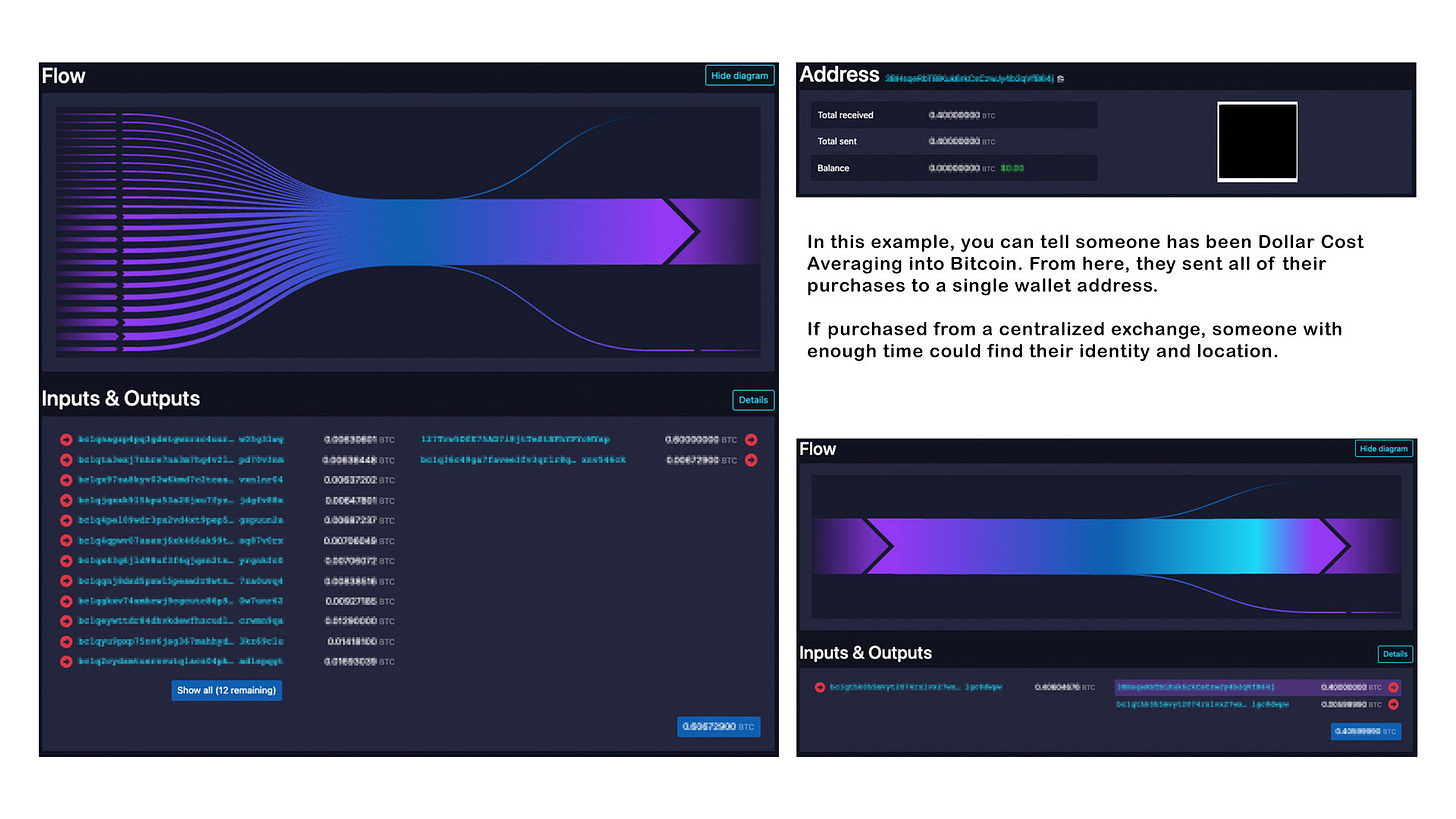Bitcoin and Privacy: A Balancing Act - #217
TL;DR - Bitcoin is not as anonymous as people think. However, several techniques can enhance anonymity.
Dear reader,
Bitcoin is often hailed as a tool for financial privacy and anonymity, but the truth is that using it does not necessarily guarantee anonymity.
Know-Your-Customer (KYC) ramps that are used to exchange fiat for Bitcoin tie the purchased coins to the user's identity, and Bitcoin apps are not private by default.
However, privacy is a crucial aspect of being financially sovereign, and there are several techniques that you can use to enhance your anonymity.
Firstly, it is important to understand how Bitcoin transactions work
When you send Bitcoin to someone, there are actually three transactions: one to the recipient, one to the miner, and one to yourself in the form of change.
This change goes back to the address of origin, meaning that anyone who looks it up can see your balance.
Depending on how a transaction is made, how many people know, and the resources being used, a transaction can be pseudonymous or anonymous.
UTXOs
One aspect of Bitcoin transactions that new users should be aware of is Unspent Transaction Outputs (UTXOs). UTXOs are essentially the "coins" in your wallet, and they can reveal private information if not managed properly.
For example, if you use a UTXO to make a purchase, the change from that transaction will go to a new UTXO, which could reveal your balance if someone tracks it. Therefore, it is important to manage your UTXOs properly and not reuse them.
Why privacy is important
Privacy is a fundamental human right and a critical component of a free and open society. As individuals, we have the right to control our personal information and decide how much we want to share with others. This includes our financial transactions and the way we choose to conduct business.
Without privacy, our personal information can be easily accessed and used against us, exposing us to risks such as identity theft, financial fraud, and discrimination.
In a free market, privacy is essential for fostering innovation and competition. When businesses can operate without fear of government or corporate surveillance, they can freely pursue new ideas and products that benefit society. Consumers also benefit from the ability to make informed choices about which products and services they use, without fear of being tracked or monitored.
Without privacy, businesses can gain an unfair advantage over their competitors by using personal data to target their advertising and manipulate consumer behavior.
Privacy Practices and Tools
Basic OpSec
There are several techniques that you can use to enhance your anonymity when using Bitcoin. Basic Operational Security (OpSec) practices, such as not talking openly about your Bitcoin, avoiding Bitcoin-oriented clothing, and not reusing Bitcoin addresses, can help maintain anonymity. Using pseudonyms instead of your real name and more private communication tools for email and chat can also help.
Using separate devices
Using a separate phone or computer that is dedicated only to Bitcoin can help with privacy because it reduces the chances of cross-contamination with other online activities or personal data. By keeping Bitcoin-related activities isolated on a separate device, you can reduce the chances of accidentally exposing your Bitcoin activity or personal information to prying eyes or malware.
For example, if you use your regular phone or computer for both personal and Bitcoin-related activities, it is possible for hackers or other malicious actors to gain access to your Bitcoin wallet or personal data through vulnerabilities in other apps or software installed on your device. By using a separate device that is dedicated solely to Bitcoin, you can reduce this risk and improve the privacy and security of your Bitcoin-related activities.
Note: that using a separate device does not guarantee complete privacy and security, and other best practices such as using strong passwords, regularly updating software, and avoiding public Wi-Fi networks should also be followed to maximize privacy and security.
Privacy Apps
Privacy wallets such as Sparrow Wallet or Samourai Wallet, and CoinJoins and management, are also effective Bitcoin privacy techniques. Sparrow Wallet, for example, mixes your coins after receiving them, and good labeling techniques ensure you know the who, what, when, and where the coins came from. When sending, make sure to use the full UTXO. UTXOs create new addresses, and when sending full amounts, it shows the associated address as empty afterward.
The Lightning Network
The Lightning Network can also help enhance your anonymity. Lightning apps can help you add another layer of privacy. Ensure that you're using it through TOR and sending freshly mixed UTXOs, one by one, to a lightning app such as Phoenix or Breez. Sending in small amounts ensures better and more successful payment routing.
Privacy Limitations
Keeping a low profile can be challenging because it requires a high level of vigilance and attention to detail. It can also mean giving up certain conveniences, such as using public Wi-Fi or social media platforms that track user activity.
Fees for mixing coins and sending individual UTXOs can indeed be costly and time-consuming, especially if done repeatedly or on a large scale. Additionally, users must be cautious of the mixing service they use, as some may be operated by malicious actors seeking to steal user funds.
Privacy apps and the Lightning Network also come with their own risks. Users should thoroughly research and vet any app or network they use, as malicious actors or nodes could potentially compromise the user's privacy or security.
While there are techniques that can enhance privacy when using Bitcoin, it is important for users to be aware of the potential risks and limitations associated with these techniques. As always, users should exercise caution and conduct thorough research before implementing any privacy-enhancing techniques.
Remember: Don’t trust, verify.
Conclusion
Bitcoin is not an anonymous financial tool, and its users are not necessarily as anonymous as they might think.
KYC ties Bitcoin to their identity, and Bitcoin apps are not private by default. However, there are several privacy techniques you can use to enhance your anonymity, from basic OpSec to using privacy wallets, CoinJoins and management, and the Lightning Network.
By following these techniques and properly managing your UTXOs, you can maintain your privacy and financial sovereignty when using Bitcoin.
Until next time,
Rare Passenger
Support Living on Bitcoin
If you enjoyed Living on Bitcoin, show your support by leaving a tip https://getalby.com/p/lvngnbtc








Well written as always 👍